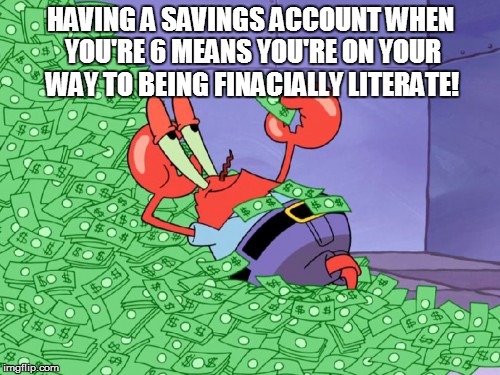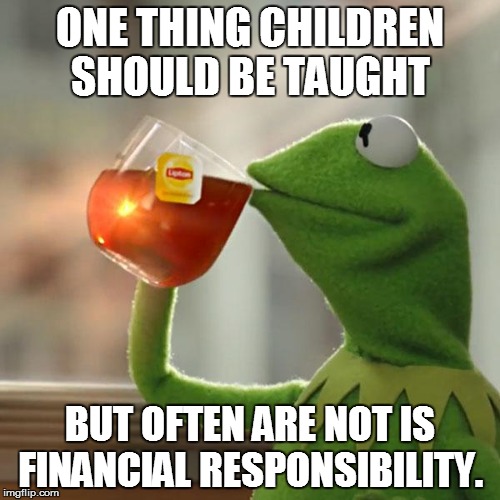At what age should you start a saving account for you kids?

I may be a little bias but when I was 6 years old my grandmother and grandfather opened my first saving account at Merchants and Marines Bank. I remember my grandmother taking me to the bank at a young age to withdraw and deposit money. Of course, the tellers wouldn’t allow me to make transactions but my grandmother would let me tell the teller what transactions I would like to make and she would sign off on them. I can even remember the times my grandfather would take to the bank to take out loans. I would sit in the loan office with him at the bank and learn all about the loan process. I should note that my grandfather often took out loans simply to build his credit. He would apply for a loan and save the money in his saving account to pay the monthly installments.
My grandfather played a significant role in my financial literacy. He was the first person to introduce my to the check writing process as a child outside of school.If I remember correctly we learned about check writing in the 3rd grade and I was an expert by the time my grandfather was done having me practice.He would ask me to write checks for him early in elementary school. I would write his checks and balance his checkbook. It was great practice for my basic math skills and it taught me a life skill in the process.
In addition, my grandfather later was influential in helping me to initiate and build my credit. He was able to help me with my credit by being the consignee on my very first car. It’s kind of funny story; when I was a freshman in college I wanted or rather needed my own car after sharing one with my mom throughout high school. At this point, I was going to be commuting back and forth to college daily and I certainly wasn’t interested in being driven by my mom. So on the first day of college classes ended early I rushed home to drag my mom and grandma to the dealership to look for a car. After coming to an agreement with my mom about which car I could get we went in to complete the paperwork. Furthermore, due to my grandfather’s good standing with the bank and his excellent credit score I was able to finance my first car with a work-study position at my community college. His reputation with the bank was so good we didn’t even have to go to the bank to sign the loan we did everything right from the car lot. Due to my grandfather consigning for my first vehicle I ended having a great credit score at a very young age and when I decided to upgrade my car after college I was able to purchase a brand new car with no cosigner at about 21 years old; something most people can’t even do at 25 or 30.
I was taught well before I even thought about college about the negatives of credit cards and I didn’t officially get my first credit card until I was almost 30. I grew up with the mantra that credit was for houses, cars, and education. Up until my mid to late twenties, the only thing I had on my credit report was my car and student loans. I always had an emergency fund bank account separate from my regular checking and savings which I usually kept at a separate bank so I was sure it was set aside. When I was in college and didn’t get financial aid for summer school that emergency fund was quite handy.I say all of this to note the fact that raising finally responsible and knowledgeable children will help ensure they become financially literate adults.

Between the ages of 6 and 8 is a good time to start teaching children about money. A good way to start teaching children responsibility and the value of money is by giving them an allowance. The key is to teach them how to manage their allowance by introducing them to financial concepts such as saving and investing money in a bank account and even donating. Teach them to invest a portion of their allowance and monetary gifts into a saving account. Even at 6 years old a child can learn the importance of saving money. The first step could be having the child save money in a piggy bank at home for a certain period of time or until they reach a certain amount of money. Then take them to the bank to open an account and deposit the money. Even a young child can learn this concept.You can even explain to them in simple terms that they get “extra money ” (interest) by leaving their money in the bank and not spending it. It is also a great idea to have the child save their monetary gifts for birthdays or other holidays where they receive money or save it for them depending on their age. Talk to them about budgeting explaining that they get to spend a certain amount of money, they have to save some and they can give some to charity or even church.You can even teach them about investing in other things besides saving like the stock on http://www.stockpile.com. You can have relatives, friends and yourself buy stock for special occasions instead of toys or other items. It is never too early to teach a child about investing for their future. Start your children off with stocks and bonds now and they could be millionaires one day!
It’s never too late to teach or learn financial responsibility either. However, teaching a preteen or teenager about finances can be a little more in-depth. If your child is an older preteen or teenager you can make an agreement that they have to save a certain percentage of the money they receive but they get to keep the rest to spend. Also, a preteen or teenager should be taught about budgeting, setting financial goals, credit, and understanding how money works in our daily lives. At about 13 would be a good time to start teaching the concept of credit, bills, the stock market, credit cards, loans, and checking accounts and debit cards. We don’t want to send our children out into the world financially illiterate. They can only learn so much at school. In addition, most students don’t even take a personal finance class until college and everyone doesn’t attend college so it is up to parents to teach children basic finances. If you are not financially savvy yourself because you were not fortunate enough to have as family who talked about or taught personal finance in your home there are plenty resources available and books to read to help. The main thing is to teach them what you know and to prepare them as much as possible for managing their finances in adulthood. The most important thing is that they learn financial survival skills including paying bills, having a budget and managing their money. There are several resources online and in your local library that can help you teach budgeting.
Secondly, another very important concept to teach is credit and the significance of credit scores. Teens need to learn about how to use credit before 18 so that they will be able to make informed decisions when they become eligible for credit. (It’s also important that parents do not use their children’s credit before they are eligeble to use it) Having a good credit history is crucial in this century because at this point credit scores are used for everything from car insurance rates to employment background checks. You do not want your child to miss out on a great opportunity because their credit was ruined at a young age. Furthermore, it’s also vital that we teach young adults to save money in an emergency fund rather than use a credit card for emergencies. Credit cards are not for emergencies; that is the quickest way to get into debt that is difficult to get out of. Credit cards should be a credit building tool only. Teens and young adults should learn that credit cards should only be used to make small purchases for which they can pay off immediately or at least monthly. This strategy can easy help them build their credit for future major purchases.
Lastly, the one thing that teens must learn above all else is to budget like their life depends on it because it does. If a person knows how to budget and manage their money it will make every other concept of money easier. Whether your teen has a job, receives an allowance, or does odd jobs for money it of the utmost importance they learn to budget properly. The first skill they should is how to create and use a budget. If they can budget it means they can manage their money and money management is a life skill that every person needs. Teach them to budget even if they don’t have bills. They can create a simple budget that includes saving, donations, gifts, and spending money. They can budget per pay period as they may not have any monthly bills or only a cell phone bill. They can incorporate basic needs such as food or eating out, buying gifts for friends on holidays or birthdays, gas if they drive, or entertainment such as going to the movies or other events.They can use their budget to save for future expenses such as prom or a car. The purpose of this is to give them practice planning and budgeting their expenses.
In conclusion, its our duty as adults, parents, grandparents, aunts, uncles, and so forth to instill in today’s youth the value of money, the significance of credit and how to properly use and manage both.
Children’s Books
Bernstein, Stan & Jan. The Bernstein Bears’ Trouble with Money. New York: Random House, 1983.
Chatzky, Pam. Not Your Parents’ Money Book. New York: Simon & Schuster Books for Young Readers, 2010.
Hall, Alvin. Show Me the Money. London: DK Publishing, 2008.
Larson, Jennifer S. Do I Need It? or Do I Want It?: Making budget choices. Lerner Publishing Group, Inc, 2010.
Lynette, Rachel. What to Do When Your Family Is In Debt. New York: The Rosen Publishing group, Inc, 2010.
Rau, Dana Meachen. Saving Money. New York: Gareth Stevens Publishing, 2010.
Scheunemann, Pam. Cool Jobs for Kids Who Like Kids: Ways to Make Money Working With Kids. Edwin, Minnesota: ABDO PublishingCompany, 2011.
Web Resources
http://thebudgetnistablog.com/2016/free-tool-will-teach-child-value-money/
http://www.wellsfargo.com/resource_center/agent_saver/
https://home.capitalone360.com/kids-savings-account
https://www.pnc.com/en/personal-banking/banking/savings/s-is-for-savings.html
https://www.thebalance.com/savings-account-for-a-baby-2085556
